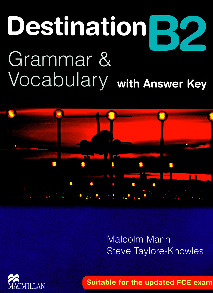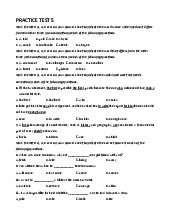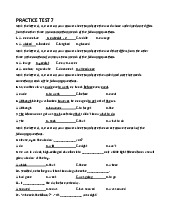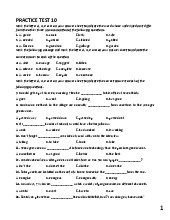


Preview text:
lOMoAR cPSD| 45438797
II. Read the text below and fill in each blank with ONE suitable word. (2.0 pts)
The British are widely (1) _____ to be a very polite nation, and in (2)______ respects this is true. An
Italian journalist once commented of the British that they need (3) _____ fewer than four “thank you” merely
to buy a bus ticket. The first, from the bus conductor means, “I’m here.” The second accompanies the
handing over of the money. The third, again from the conductor, (4) ____ “Here is your ticket.”, and then
the passenger utters a final one as he accepts the tickets. Such transactions in most (5) ____ parts of the
world are usually conducted in total silence. In sharp contrast to this excessive politeness with strangers, the
British are strangely lacking (6) _____ ritual phrases for social interaction. The exhortation “Good appetite”,
uttered in so (7) ______ other languages to fellow-diners before a meal, does not exist in English. The nearest
equivalent – Enjoy your dinner! – is said only by people who will not be partaking of the meal in question.
What’s more, the British (8) ____ happiness to their friends or acquaintances only at the start of a new year
and at (9)_____ such as birthdays, (10) _____ the Greeks routinely wish all and sundry a “good week” or a “good month”. Your answers:
1._____________ 2._____________ 3._____________ 4._____________ 5.____________
6._____________ 7._____________ 8._____________ 9._____________ 10.____________
III. Read the passage and choose the best option for each of the following blanks. (2.0 pts) Media and advertising
After more than fifty years of television, it might seem only obvious to conclude that it is here to (1) ______.
There have been many objections to it during this time, of course, and (2) ______ a variety of grounds. Did
it cause eye-strain? Was the (3) ______ bombarding us with radioactivity? Did the advertisements contain
subliminal messages, persuading us to buy more? Did children turn to violence through watching it, either
because so (4) ______ programmes taught them how to shoot, rob, and kill, or because they had to do
something to counteract the hours they had spent glued to the tiny screen? Or did it simply create a vast
passive (5) ______ drugged by glamorous serials and inane situation (6) ______ ? On the other hand did it
increase anxiety by sensationalizing the news [or the news which was (7) ______ by suitable pictures] and
filling our living rooms with war, famine and political unrest? (8) ______ in all, television proved to be the
all-purpose scapegoat for the second half of the century, blamed for everything, but above all, eagerly
watched. For no (9) ______ how much we despised it, feared it, were bored by it, or felt that it took us away
from the old paradise of family conversation and hobbies such as collecting stamps, we never turned it off.
We kept staring at the screen, aware that our own tiny (10) ______ was in if we looked carefully. 1. A. be B. stay C. exist D. prolong 2. A. with B. over C. by D. on 3. A. screen B. danger C. machine D. reason 4. A. that B. far C. many D. what 5. A. programme B. personality C. audience D. tense 6. A. comedies B. programmes C. perhaps D. consequently 7. A. taken B. presented C. capable D. accompanied 8. A. Taken B. All C. Somewhat D. Thus 9. A. one B. matter C. difference D. reason 10. A. fault B. reflection C. situation D. consciousness
PART FOUR: WRITING (6.0 POINTS)
I. Finish the second sentence in such a way that it means exactly the same as the sentence printed
before it. (2.0 pts)
1. If the work is finished by lunchtime, you can go home.
→Get____________________________________________________________________________
2. You haven’t done your work, have you?
→It’s about_______________________________________________________________________
3. The fourth time he asked her to marry him, she accepted.
→Only on his _____________________________________________________________________
4. He said that he had won as a result of good luck.
→He attributed____________________________________________________________________
5. That reminds me of the time I climbed to the top of Mount Fuji. →That takes
me____________________________________________________________________
6. People rumour that he is rich but stingy.
→What__________________________________________________________________________ _
7. Such a ridiculous proposal isn’t worth serious consideration. lOMoAR cPSD| 45438797 →There
is_________________________________________________________________________ 8. Just
thinking about his face at that moment makes me laugh. →The
very_________________________________________________________________________ 9.We
cannot see animals in a vast area after the forest fire.
→There is an_______________________________________________________________________
10.The staff hated Frank’s new policies so intensely that they went on strike. →So intense
_______________________________________________________________________
II. Write a new sentence similar in meaning to the given one, using the word given in the brackets. Do
not alter the word in any way. (2.0 pts)
1. I suddenly realized the meaning of a “freebie”.(dawned)
→_______________________________________________________________________________
2. After the scandal, he was asked to resign. (HAND)
→_______________________________________________________________________________
3. Bruce said that the situation at work was like a family argument. (likened)
→_______________________________________________________________________________
4. My father is not feeling well these days. (weather)
→_______________________________________________________________________________
5. I don’t think this record will ever be popular. (catch)
→_______________________________________________________________________________
6. His arrival was completely unexpected. (took)
→_______________________________________________________________________________
7. The success of our local theater has made our city famous. (map)
→_______________________________________________________________________________
8. He is certainly not a reliable witness. (means)
→_______________________________________________________________________________
9. Our company is the only company allowed to import these chemicals. (monopoly)
→_______________________________________________________________________________
10. It’s uncertain whether the band’s tour will take place. (BALANCE)
→_______________________________________________________________________________




